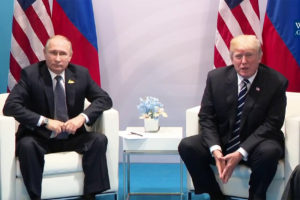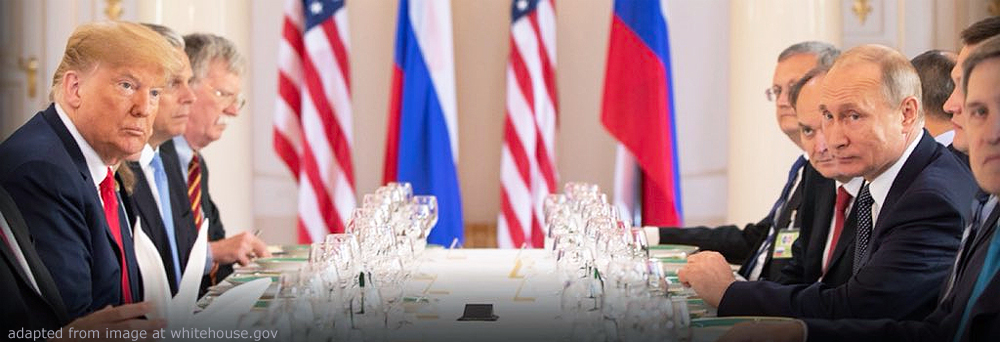Don’t Bet on Reset: U.S.-Russian Relations in the Wake of the Coronavirus

(Russia Matters – russiamatters.org – Nikolas K. Gvosdev – April 22, 2020)
Nikolas K. Gvosdev is the Captain Jerome E. Levy chair at the U.S. Naval War College and a senior fellow at the Foreign Policy Research Institute (FPRI).
Vladimir Putin, during his two-decade tenure as either Russia’s president or prime minister, has now experienced several iterations of a peculiar cycle in U.S.-Russian relations: a pattern of deterioration edging toward greater hostility suddenly interrupted by a major crisis that offers the opportunity to reset ties between Washington and Moscow. No such opening occurred during the last year of the Clinton administration, but subsequent instances — during the tenures of George W. Bush and Barack Obama — ultimately failed to produce the type of Russian-American relationship Putin seeks. Yet Putin hopes that by offering himself as a partner to the Trump administration during a new crisis — the coronavirus pandemic — he can achieve this long-elusive breakthrough with his fourth American president.
The COVID-19 crisis is destabilizing the U.S.-led international order as American commitments to international organizations like the World Health Organization are tested and as important alliance relationships are strained. It is also inflicting significant damage on the U.S. economy, thus jeopardizing Trump’s hope for re-election. Not only does this create an opening for Putin, but in Donald Trump he also has a U.S. president much more temperamentally inclined to engage in the type of great-power transactionalism Putin prefers. In addition, Trump has shown a marked disinclination in the midst of this crisis to work through institutions and through the mechanisms of the Western alliance. Instead of embracing the rhetoric of America’s G-7 partners, who are talking about “collaboration” and “cooperation” and the importance of respecting “international partners,” Trump seems to prefer the image of decisive men of power coming together to take decisive action unhindered by diplomatic niceties and bureaucratic procedures.
As many observers have noted, Trump views himself through the lens of a “deal maker” — someone who reaches out directly to other principals to reach agreements. The American president has been crediting his personal intervention and skills as the reason why the Russia-Saudi oil price spat was settled earlier this month and the reconstitution of the OPEC+ production cut agreement was blessed by the G-20. (The reaction of global markets since that deal was promulgated, however, with oil prices technically reaching negative territory for a period of time, suggests that traders and business leaders do not share Trump’s confidence in the efficacy of the arrangement.)
Indeed, given the unprecedented amount of contact between Trump and Putin over the past two weeks, with multiple phone calls and discussions of a wide-ranging bilateral agenda, analysts in both the United States and Moscow are speculating as to whether both leaders are laying the groundwork for yet another reset of U.S.-Russian relations. David Ignatius asks whether the two presidents “will move forward with meaningful dialogue on additional issues” while Vladimir Frolov speculates on whether Putin can get Trump to agree to a “universal reset” which will recognize Russia’s position as one of the world’s agenda-setting powers.
In an echo of the post-9/11 phone call between Putin and George W. Bush, the Russian president, in his discussions with Trump on March 30, offered Russian assistance in providing medical equipment, an offer Trump accepted in a public statement of gratitude.
Yet, to be blunt, talk is cheap. Multiple phone calls between Putin’s dacha and the Oval Office have had no impact on a series of aircraft encounters in the Mediterranean, where U.S. and Russian military commands have apparently not gotten the memo that a new reset is in the works. So, the real test is what exactly Trump and Putin are prepared to do.
Trump may be the first U.S. president in the modern period to be most inclined to reach a deal with the Kremlin, but he is also the hamstrung Chief Executive. Expansive and broad-ranging sanctions legislation-which he himself signed into law-imposes key penalties not only on different parts of the Russian economy, but also on third parties who purchase Russian military equipment or assist the construction of Russia’s Nord Stream 2 pipeline. Moreover, these restrictions carry no sunset clause, so that even Joe Biden, should he replace Trump in office after the November election, would also be, if he were even so inclined, unable to initiate a repeat of the Barack Obama-Dmitry Medvedev reset.
It goes without saying that the Democrats in Congress oppose any rapprochement with the Kremlin, but improving ties with Putin seems to be the one area where Republicans—who in all other areas tend to be faithful executors of the president’s will—refuse to follow. Sen. Ted Cruz, for instance, has dispensed with the more antiseptic national security language describing Russia as a competitor to flat out label Moscow as an “enemy.” Keeping the pressure on Putin is perhaps the only genuinely bipartisan policy initiative left in Washington.
Nor is the bureaucracy seeking to anticipate a shift in Russia policy. As of writing, U.S. sanctions on Rosneft for its activities in Venezuela remain in place despite a sudden transfer of those assets to a new Russian state company; the U.S. national security system seems to be in no hurry to graduate Rosneft from these penalties. Indeed, this would be the easiest gesture the U.S. administration could make if a reset with Russia were truly in the works; thus, the fate of the Rosneft sanctions should be taken as a bellwether as to whether a substantive improvement is pending.
At the same time, given the potential that the coronavirus pandemic has to wreak problems with the Putin system itself, proponents of great power competition within the U.S. national security apparatus would argue that it is ludicrous for the United States to throw Moscow a life preserver when the virus, the oil crisis and the economic aftermath has the real possibility of transforming Russia from a near-peer into a non-peer competitor. Indeed, Putin’s own hold on power may be weakening. Why make premature concessions if America’s “Putin problem” might, finally, end up resolving itself on America’s terms? (Of course, every crisis seems to presage Putin’s imminent departure, and there is a strong case to be made that Russia will “be able to ride through the combination of COVID-19 and lower oil receipts without a crisis.”)
For his part, Putin is always willing to talk and propose, and he is not unmindful about the perception his close contact with Trump has created-as well as the consternation it engenders with America’s European partners. But having seen this rodeo more than once, he is also giving up nothing of substance. Stripped to its bare essence, Trump’s request of Putin is that during this crisis, Russia accept the status quo as it stands and not take advantage of America’s need to focus inward to combat the coronavirus. Putin has no interest in taking a pause-whether in Syria, Ukraine or in trying to foment problems within the Euro-Atlantic community-simply because Trump needs to devote more attention to domestic issues. Instead, Putin has learned another important lesson: take advantage of when America is distracted in order to create new facts on the ground.
Certainly, discussions with Trump about energy coordination is not stopping Russian companies from taking advantage of the crisis to squeeze out the United States from Asian energy markets. One would expect that in conditions of a reset, the U.S. and Russia would work toward some sort of energy condominium for mutual benefit, but no matter what leaders may say in their phone calls, Russian and American energy firms see each other as competitors.
So color me skeptical if I don’t see a 2020 rendition of a U.S.-Russia reset on the horizon.
Article also appeared, with different images, at russiamatters.org/analysis/dont-bet-reset-us-russian-relations-wake-coronavirus, with different images, bearing the notice: “© Russia Matters 2018 … This project has been made possible with support from Carnegie Corporation of New York,” with a footer heading entitled “Republication Guidelines” linking to: russiamatters.org/node/7406, which bears the notice, in part:
“If you would like to reprint one of these articles, a blog post written by RM staff, one of our infographics or a fact-check, we ask that you follow these guidelines:
- Include a prominent attribution to Russia Matters as the source and link back to the original at RussiaMatters.org.
- Retain the hyperlinks used in the original content.
- Do not change the meaning of the article in any way.
- Get an ok from us for non-substantive changes like partial reprints or headline rewrites and inform readers of any such modifications (e.g., This article first appeared on the Russia Matters website with the headline “Russian Election Interference in Trump’s Own Words”).
- Let us know about the reprint and send a link!
Please note that Russia Matters cannot grant permissions for third-party content, including articles, photographs and other materials not produced by our team.
Questions? Email us at RussiaMatters@hks.harvard.edu.”
[featured images are file photos]

